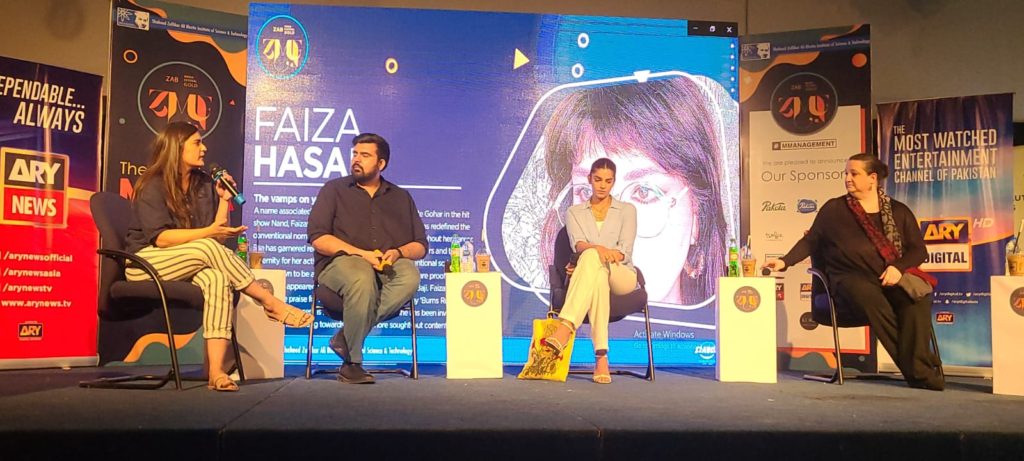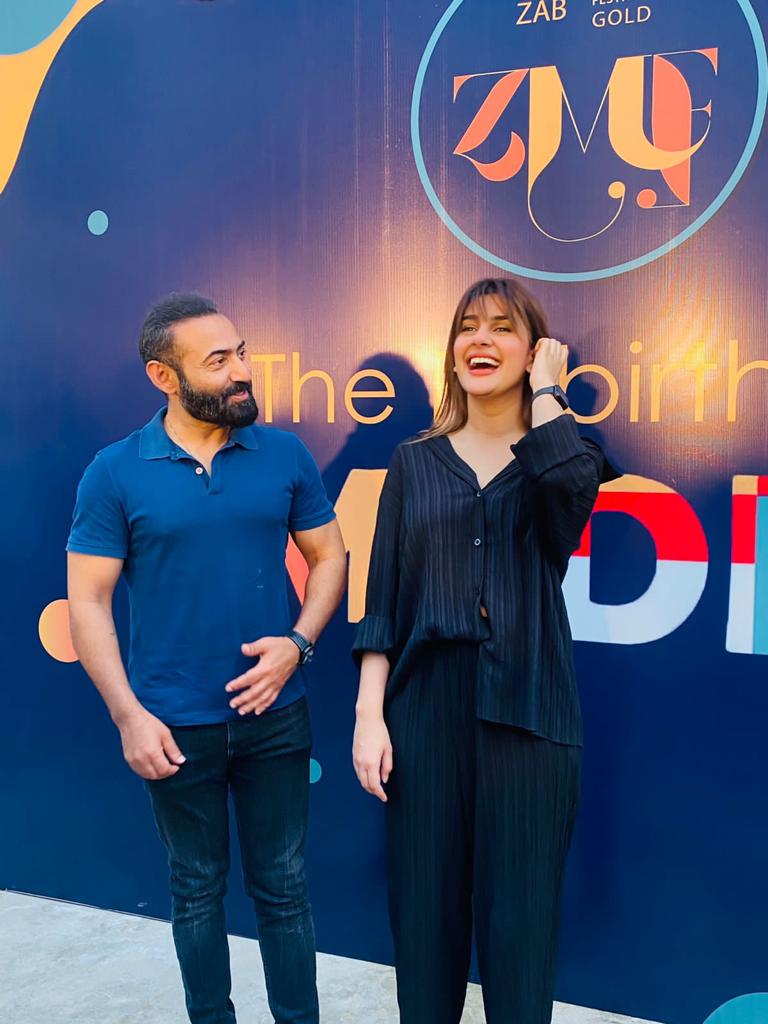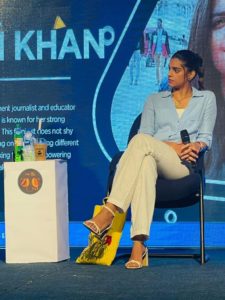
Every year, the Zab Media Festival (ZMF) hosts a wonderful opportunity for the film and TV fraternity to get together. This year, filmmakers like Asad Haq, Fizza Meerza, and Nabeel Qureshi spoke about films and guided students on what to expect when they join the industry, while TV anchors like Huma Shah and Anoushey Ashraf spoke about the TV environment within which they operate. Countless other names, such as Zahid Ahmed, Kubra Khan, Farhan Saeed, and Nadeem Baig were also seen in attendance.

Filmmaker Nadeem Baig and Kubra Khan
I had the privilege of moderating a panel as well, and it was one of the most needful conversations of the hour, even if I say so myself. Speaking to journalists Fifi Haroon and Shahjehan Saleem, and actors Sanam Saeed and Faiza Hasan (who was joining remotely from the UK), the conversation addressed ‘vamps on your TV’, discussing how female antagonist roles are created, portrayed and dealt with on the small screen.
One of the most incredible things about this panel was the wealth of knowledge on display, with Fifi and Shahjehan talking about the dichotomies that exist for women on TV – the Madonna/whore complex, how women either have to choose between the damsel role, or the conniving evil vamp. That nuance is missing from our characters, which is what all panelists hope that TV writers and channel owners will aspire towards in the near future.
What was also interesting to see was how Sanam Saeed and Faiza Hasan were on two opposite ends of a discussion but there was room for disagreement and a lot of respect between the two when they spoke. Usually, panel discussions either become echo chambers where everyone simply agrees with each other or is on the same side of the argument (this results in conversations becoming stale and incomplete), or when there is disagreement, people tend to become rude or violent (countless examples of politicians flinging their glasses at each other and storming off sets). It was refreshing to see both actors encouraging each other to speak their mind and not getting offended or taking it personally if the other had a different point of view.
When asked about how much responsibility actors must assume when accepting vamp or antagonistic roles, Faiza Hasan simply answered that she was a performer and therefore not reforming society. Her job, she said, was to make sure the character is believable, that she does justice to her work, and that her producers and audience are happy with her performance. “But having said all that, I want to say that showing slaps on TV is not okay. This is wrong and it needs to stop.”

Sanam, on the other hand, said that she wished she was as brave as Faiza, because she chooses her characters responsibly. “There are young girls who look up to me, to the characters I play and the decisions they make on TV. I want do some social good and that’s why I try to choose roles that leave a positive impact in the real world also.”
While both actors had different ideas of how responsible an actor should be, they both agreed that its every actor’s wish to play vamps because they are more fun and challenging for performers.
But Sanam Saeed also asked a very important question mid conversation. “What do we even mean when say vamp? What’s a vamp?” And the answers that started coming up from the panel made the actors realize that a vamp on Pakistani TV is any woman who isn’t sacrificial, who tries to serve and protect her needs instead of being a doormat, who argues and rebels and doesn’t take shit from others silently. Unfortunately, whenever such a woman takes centre stage in a TV production, she’s almost always met with a horrific or tragic end (she’s shunned from society, killed off, abandoned.)
Fifi then pointed out that we need to humanize women on TV. Good people do bad things, and bad people do good things in real life; we are inherently flawed as human beings and that needs to reflect more often on TV.




I’ve been using it for a month for cross-chain transfers, and the stable performance stands out.
Nice read, I just passed this onto a friend who was doing some research on that. And he actually bought me lunch as I found it for him smile So let me rephrase that: Thank you for lunch!
The transparency around low fees is refreshing and builds trust. Definitely recommend to anyone in crypto.
Your point of view caught my eye and was very interesting. Thanks. I have a question for you.
I was skeptical, but after recently of cross-chain transfers, the intuitive UI convinced me. I moved funds across chains without a problem.
I switched from another service because of the great support and stable performance.
?Let us raise our toasts to every visionary of the future !
Feeling secure in your transactions is essential when playing at a casino ПЂОїП… ОґОП‡ОїОЅП„О±О№ mastercard. The industry-standard encryption technologies provide layers of protection for both deposits and withdrawals. [url=http://casinopaymentmethods.org/][/url]. Knowing your information is safe can significantly improve your gaming experience.
Finally, when you’re ready to take your gaming to the next level, consider the advantages of using PayPal at your chosen casino. It not only enhances convenience and security but also opens up new avenues for promotions and bonuses. Embracing this payment method can enrich your overall online gambling experience.
О•ОѕОµПЃОµП…ОЅО®ПѓП„Оµ casino ПЂОїП… ОґОП‡ОїОЅП„О±О№ П„ПЃО±ПЂОµО¶О№ОєО® ОјОµП„О±П†ОїПЃО¬ ПѓО®ОјОµПЃО± – https://casinopaymentmethods.org/#
?May fortune move forward with you with endless surprises winning plays !
I was skeptical, but after over two years of staking, the great support convinced me.
The interface is wide token selection, and I enjoy using the API here. Perfect for both new and experienced traders.
I was skeptical, but after a month of checking analytics, the easy onboarding convinced me. My withdrawals were always smooth.
I’ve been active for a few days, mostly for providing liquidity, and it’s always low fees.
I personally find that the best choice I made for using the API. Smooth and stable performance.
I personally find that the interface is reliable uptime, and I enjoy cross-chain transfers here.
Heya! I’m at work browsing your blog from my new iphone! Just wanted to say I love reading your blog and look forward to all your posts! Keep up the superb work!
The best choice I made for portfolio tracking. Smooth and trustworthy service. Support solved my issue in minutes.
I’ve been using it for several months for swapping tokens, and the great support stands out. I moved funds across chains without a problem.
I was skeptical, but after several months of staking, the robust security convinced me.